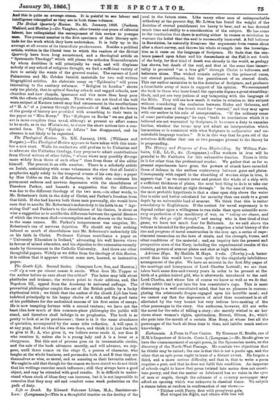soul in the future state. Like many other men of
unimpeachable orthodoxy at the present day; Mr. Litton has found the weight of the doctrine of eternal punishment too heavy to bear, and an has devoted much time and ability to a consideration of the subject. He has come to the conclusion that there is nothing either in reason or revelation to warrant the belief that the soul is necessarily immortal. A full believer in Revelation, he naturally dismisses the arguments from reason alone after a short survey, and throws his whole strength into the investiga. tion as it rests on the language of Scripture. Ho finds that the sen- tence passed upon Adam and his descendants at the Fall is not death of the body, for that kind of death was already in the world, as geology has shown, but death of the soul, and that at the same time immor- tality is promised "as a free gift" through Christ to believers, and believers alone. The wicked remain subject to the primaeval curse, not eternal punishment, but the punishment of an eternal death. This our author maintains to be the doctrine of Scripture, and produces a formidable array of texts in support of his opinion. We recommend the book to those who have found the opposite dogma a great stumbling- block, and yet are very jealous of any tampering with the language of the Bible. They will see how much it varies in relation to this subject without considering the contusion between Hades and Gehenna, and the different uses of the Greek word for "eternal," and they may agree with our author in his rule of interpretation. "If the ordinary sense of some particular passage," he says, "leads to conclusions which it is believed are not warranted by Scripture, it be comes a duty to examine farther, whether the terms may not admit an interpretation which harmonizes or is consistent with what Scripture in unfigurative and un- mistakable language teaches." It is in this way that he gets rid of the notorious difficulties that one or two passages present to the theory ha is propounding.






























 Previous page
Previous page